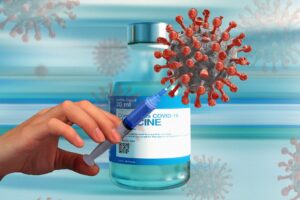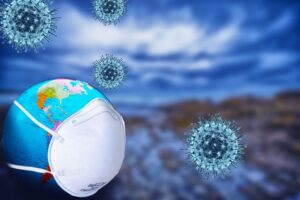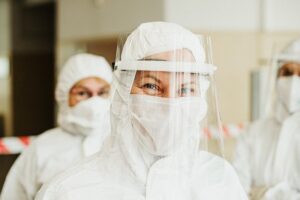
The US Food and Drug Administration and the UAE Ministry of Health and Prevention (MoHAP) both recently approved the emergency use of Sotrovimab (Vir-7831), an encouraging new treatment for patients battling Covid-19. Developed by GlaxoSmithKline (GSK) and Vir Biotechnology, Sotrovimab is a monoclonal antibody-based treatment which in clinical trials greatly reduced a coronavirus patient’s chances of being hospitalised or dying from the disease.
In the 18 months since the Covid-19 pandemic first seized hold of the global consciousness, most attention has been paid to the race to develop and roll out vaccines around the world. Fortunately, this achievement has been reached in record time, and hundreds of millions of individuals have already been fully vaccinated with highly effective inoculations.
Despite the successful development of a number of excellent vaccines, however, the world still needs effective treatments for those people who do become infected with the deadly disease. For one thing, access to vaccinations in the developing world remains devastatingly scarce; in the Central African Republic, for example, just 667 doses have been administered among a population of close to five million. Despite making up 17 percent of the world’s population, Africa has benefitted from a mere one percent of the 1.3 billion shots so far administered worldwide.
What’s more, vaccine hesitancy is proving a significant barrier for public health authorities keen to expedite herd immunity. In France, where an additional 20 million people became eligible for the vaccine this week, doctors have begun to warn that the vaccination effort is facing a summertime plateau like those already recorded in the US, UK and Israel.
As such, the limitations of the Covid-19 vaccination regime drive home the need for new, lifesaving treatments for the disease. While antibody therapies such as the Sotrovimab treatment recently approved by the US and UAE have shown great promise, they, too, have their own limitations. They need to be delivered intravenously in a hospital setting, for example, and may not work as well against emerging variants as against the original disease identified in Wuhan.
In the meantime, drugmakers face several hurdles in the race to develop an oral treatment for COVID-19. Unlike the vaccine, which works to trigger the body’s own immune system, an antiviral pill must block the virus from spreading throughout the patients’ body while also protecting healthy cells. Testing, too, is a major challenge: trial participants must have recently contracted the disease, and show sufficient symptoms for drugmakers to prove the drug has had a “meaningful impact” on patients’ health.
Fortunately, there are a number of encouraging prospects for coronavirus treatments, including some that repurpose existing drugs. The case of Partner Therapeutics’ Leukine (also known as sargramostim) is one such example. The FDA-approved drug is currently being tested on non-hospitalised patients at high risk of progressing to severe disease, and has already been shown to significantly improve lung function in hospitalised COVID patients. Among hospitalised COVID patients with acute respiratory failure, Leukine improved oxygenation by at least a third in over half of those treated.
“The results [from the study] represent a major advance for patients with acute hypoxic respiratory failure due to COVID-19 and validate sargramostim’s critical role in the repair and health functioning of the lung,” celebrated Dr. Bart Lambrecht, Professor of Pulmonary Medicine at The University Hospital Ghent, who carried out the recent study investigating the effects of inhaled Leukine on coronavirus patients with respiratory failure.
Still other researchers are inventing brand-new treatments, such as Israel’s EXO-CD24 medicine, touted by Israeli Prime Minister Benjamin Netanyahu as a “miracle drug.” The treatment is based on CD24-enriched exosomes, and purports to fight the cytokine storm, which can overwhelm the immune system in patients fighting the COVID-19 disease. Exosomes are responsible for cell-to-cell communication in the human body; in the case of this new treatment, they are used to deliver the CD24 protein to the lungs, which helps relax the immune system.
The inverse of a calm immune system is a cytokine storm, which is when the immune system begins to attack itself. This has shown to be one of the leading causes of death in COVID-19 patients, developing among 5% to 7% of patients within the first week of the disease.
Testing of Israel’s so-called miracle drug has delivered more than promising results; in February 96% of patients treated with EXO-CD24 were released from the hospital. Due to low COVID-19 cases in Israel, Prof. Nadir Arber of Tel Aviv Sourasky Medical Center plans to carry out further testing overseas; Georgia, which is reporting up to 1,000 daily cases, has agreed to carry out a trial once authorization is received from the European Medicines Agency.
As the world’s wealthiest countries begin to emerge from the fog of the COVID-19 pandemic thanks to accelerating vaccine campaigns, recent innovations in treatments for the disease have vastly shortened the distance to recovery for the rest of the planet and offered a layer of protection to the unvaccinated. With time and sustained investment, COVID’s grip will eventually come loose.



